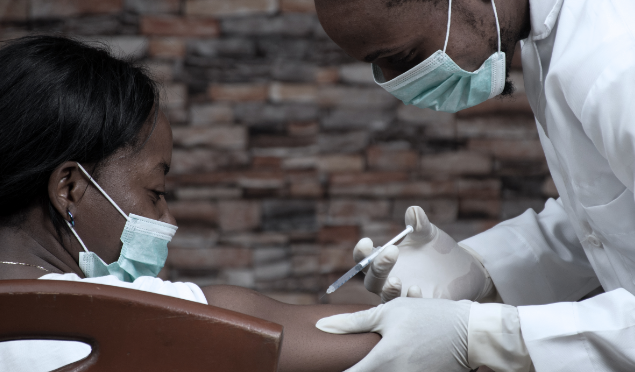Vaccine myths debunked

Published on 31st May, 2021 at 10:41 am
Vaccines are not a shot in the dark – they save millions of lives every year. Here’s what you need to know about them.
For as long as there have been vaccines, there have been people who mistrust them. Some say it’s because of their religious beliefs, or sanitary or political objections. Some people don’t trust science or their government, while others believe the many myths around vaccinations, or simply don’t think they are necessary.
Thanks to the COVID-19 vaccine, there is a fresh interest in the safety of vaccines. Research shows that most of our biggest fears about vaccinations are unproven.
Myth #1: Vaccines contain toxins
In 2005, Rolling Stone published an article focusing partly on a conspiracy theory that the US government was covering up evidence that thimerosal, a preservative containing mercury and used in vaccines, was causing autism. The article was amended after flaws and fraud in the science were exposed.
According to World Health Organization (WHO), there is no evidence that links thimerosal to health problems – plus, as the Centers for Disease Control and Prevention (CDC) also pointed out, it was removed from vaccines in 2001. There is also no evidence that today’s vaccines contain traceable and/or harmful amounts of formaldehyde or aluminium.
Myth #2: Children’s immune systems can’t handle so many vaccinations
Children’s vaccinations are spaced out from birth to age 12, with most concentrated in the first 18 months. There is no scientific evidence that this places strain on their immune systems. According to WHO: “If an infant is eligible for more than one type of vaccine, it is safe to give the different vaccines at different injection sites during the same session.”
The Department of Health also emphasises: “Never miss a chance to immunise…. If in doubt whether a child has had a certain dose or not, give that dose. Extra doses aren’t harmful.” Children are exposed to countless bacteria and viruses every day, and a healthy immune system cannot be ‘overloaded’, since its cells are constantly replenished.
Myth #3: Vaccines make you sick
Vaccines can cause mild symptoms of the diseases they protect you from, but according to a 2016 study published in The Journal of Allergy and Clinical Immunology, side effects are less-than-one-in-a-million rare. These symptoms are not a sign of infection, but a sign of the body’s immune response to the vaccine.
Myth #4: Vaccines cause autism
The falsehood that the measles, mumps and rubella (MMR) vaccine could cause autism stems from a now-debunked 1998 study by a UK doctor, Andrew Wakefield. Not only was the claim medically unsound, but a 2004 investigation also showed that he had applied for a patent for an MMR vaccine of his own and was being paid by a lawyer who was trying to sue MMR manufacturers. A subsequent investigation also found that he had performed painful and unnecessary procedures, including lumbar punctures and colonoscopies, on children. His paper was retracted, and his medical licence revoked. Yet the myth still persists, with believers cherry-picking data to support baseless claims.
One upside of the myth, though, was that it prompted a number of scientific studies – one involving 1.2 million people – with no evidence whatsoever being found that links the MMR vaccine to autism.
Myth #5: Natural immunity is better
In some cases, it could be – but just like in Russian roulette, your odds can quickly go south. According to the CDC, if you want to build immunity against measles by contracting measles, your chances of death are one in 500. Yikes.
Myth #6: With better hygiene and antibiotics, vaccines are no longer necessary
While disease rates have definitely fallen since humanity started properly washing its hands (even surgeons only started regularly scrubbing up in the 1870s), sanitising and eating healthily, the impact of vaccines on devastating diseases such as measles and polio cannot be denied.
These vaccinations are free in South Africa
Immunisation saves millions of lives every year. It works to stimulate the immune system to provide protection against specific infections. Immunisation is available for free at all state clinics in South Africa, says The National Department of Health, with the first round – against polio and tuberculosis – given at birth. Thereafter follow vaccines against diphtheria, tetanus, hepatitis B, measles and the rotavirus, among others. Read more about child immunisation here or contact the Department of Health on 012 395 8000.
Read this for five lifestyle and financial considerations if you have TB.
The diseases you almost forgot about (thanks to vaccines)
Smallpox
Status: eradicated
After killing hundreds of millions of people and wreaking havoc for more than 3 000 years, smallpox was eradicated in 1980 following a global vaccination programme by WHO. So far, it is the only infectious disease that’s achieved this distinction.
Measles
Status: dramatically reduced, with recent upticks owing to non-immunisation
After decades of low infection rates, there have been new measles outbreaks in the US among unvaccinated children.
Polio
Status: dramatically reduced, with only a few isolated pockets
Africa was declared polio-free this year, with the last case detected in Nigeria in 2016.
The COVID-19 vaccine is finally here
Vials of vaccines are being delivered to medical facilities nationwide. But it could be a while before it’s your turn. While you wait, continue with prevention efforts such as wearing a mask, social distancing and frequently washing your hands.
Reality Club, Core, Plus and Health members have free access to Trauma, Assault & HIV Assist as one of their benefits. Get 24-hour medical assistance and counselling telephonically by calling 0860 00 7325.
Want to learn more?
We send out regular emails packed with useful advice, ideas and tips on everything from saving and investing to budgeting and tax. If you're a Sanlam Reality member and not receiving these emails, update your contact details now.
Update Now







